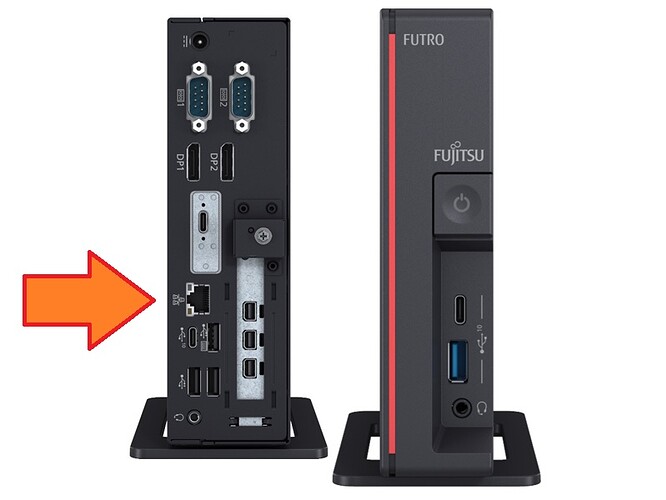Fujitsu Futro S920 is, if memory serves, a full 64-bit system. You should probably go with 64 firmware, rather than legacy firmware. Even if it were a 32-bit system, generic would be more appropriate...
Back to the matter at hand, on x86, this is quite normal. Remember, OpenWrt was originally intended for systems with a limited system device set exhaustively known in advance. x86 is anything but that.
I've had exactly the same problem installing OpenWrt on a Watchguard Firebox router. Let me explain what I did; you can follow this script; just keep substituting my data for those applicable to your case.
First, I examined he system with lspci:
lspci -nn
or, to make it more networking-specific,
lspci -nn | grep Ethernet
Initially, I was unsuccessful because lspci was not found on the system. So I had to go online using my computer, download the package file for pciutils, copy it onto the boot media for the router, and install it locally. This made lspci available. If you have a working USB port, you don't need to mess around with boot media; just bring the package over on a USB stick.
When I ran lspci as descbibed above, the output included these useful morsels of data:
Marvell Technology Group Ltd. 88E8053 PCI-E Gigabit Ethernet Controller [11ab:4362] (rev 19)
Marvell Technology Group Ltd. 88E8001 Gigabit Ethernet Controller [11ab:4320] (rev 13)
The first appears to refer to a four-port PCI expansion card, the second, to the four-port Ethernet controller integrated into the motherboard.
Next, finding drivers. Let's start with the controller on the motherboard. Its PCI identifier is 11ab:4320, so let's see if Hardware for Linux has anything on it:
https://linux-hardware.org/index.php?id=pci:11ab-4320
Indeed it does; there's a driver called skge. Now, check the list of OpenWrt packages: does a package called kmod-skge (translation: a kernel module for skge) exist? Yes, it does:
https://openwrt.org/packages/pkgdata/kmod-skge
It is described as "SysKonnect Yukon support". When you Google "SysKonnect Yukon", you see that it is a family of network interface cards (NICs) made by Marvell. Everything checks out, so do as you did with pciutils: download the package, put it onto the router's boot media (or use USB media if you can), boot, install locally. Now you have one working NIC. Configure it for Internet access and let's keep on digging; we have a whole other NIC that's dead.
The PCI identifier for the currently-dead NIC is 11ab:4362. Let's check Hardware for Linux:
https://linux-hardware.org/index.php?id=pci:11ab-4362
Success; there is a driver, it's called sky2. Next, does the package kmod-sky2 exist on OpenWrt? It does:
https://openwrt.org/packages/pkgdata/kmod-sky2
This time, the package description explicitly mentions our NIC (88E8053), so no further verification is needed. Also, we already have an Internet connection, so we can install the driver the normal way:
opkg update
opkg install kmod-sky2
The end result: two working NICs on an x86 system.
This is more or less what you need to do on your system. It's a repeating script: (1) identify NIC, (2) find the driver for it, (3) install the driver. The worst-case scenario would be if the driver for your NIC didn't exist, but we don't know that yet. So take a stab at it as described above and post your progress here...

